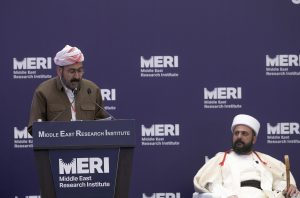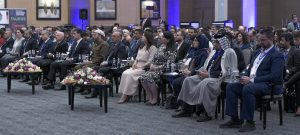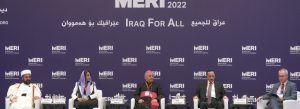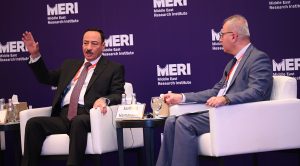Yezidis and Christians – Let us not Fail Them
Summary Report and Session Video
- Meer Hazim Tahsin, Prince of Yezidis, President of Higher Spiritual Board of Yezidis
- Ali Ilyas Haji Nasir, Baba Sheikh, Higher Spiritual Board of Yezidis
- Najeeb Mikhaeel Moussa, Chaldean Archbishop of Mosul & Aqra
- Mayan Khairy Saeed Beg, Khatoon of Yezidis
- Najim Al-Jubouri, Governor of Nineveh
- Sarhang Hamaseed, United States Institute of Peace (Moderator)
This session at MERI Forum 2022 was designed to engage policy makers and the wider public in a frank, objective and practical debate on guaranteeing the rights of Yazidis, Christians and other ethno-religious minorities in Iraq(click here for video of the session in full). The session moderator, Sarhang Hama Saeed, Director of Middle East programs at the United States Institute of Peace in Washington, said that the Iraqi Constitution includes guarantees for the rights of the components. It was designed to protect the country’s ethnic, religious, cultural and social diversity, in addition to guaranteeing freedom of expression. Hamasaeed stressed that the dialogue in this session will focus on the Yazidis and Christians, but the other components, including the Kakayis, Sabea-Mandaeans, Shabaks, Faili Kurds, Turkmans, Baha’is, black-skinned Iraqis, Zoroastrians and others, are also taken into account, and the dialogue will largely represent their affairs and aspirations too.
Sarhang Hamaseed added that the ethno-religious components in Iraq not only feel that they are not sufficiently involved and represented, but also feel that their entire existence in Iraq is threatened by genocide, displacement or migration. This is a genuine feeling experienced by many in Iraq when al-Qaida committed its heinous crimes against them and after the liberation of their areas. Therefore, these people and communities feel that they have already been let down by the governments in the province, the Kurdistan Region, the federal government, by the international community, and even by their own community leaders as well. Yes, these parties made great efforts to help, but they were not at the level of the deep wound and the level of destruction left by ISIS. Everyone should seriously deal with these problems. “Let’s not let them down again,” especially since Iraq has a new government and it has responsibilities to tackle with the issues.
Hazem Tahsin Beg, Prince of Yezidis, appreciated the efforts of the MERI and thank the Institute for “adopting our just cause, the cause of the Yazidi religion and the Yazidi community, by studying it and creating such an atmosphere to encourage dialogue about the future of Iraq and its components.” He said: “the Yazidi religion is one of the oldest religions in the region, its roots go back to pre-Islam and Christianity. The religion is based on peace, coexistence and humility. The Yazidi society is native with ancient traditions, and its culture rooted in this homeland before empires and invaders entered it. We did not pose a threat to anyone or to any belief, nevertheless, we have faced throughout history 74 campaigns of genocide, the last of which was at the hands of the terrorist organization ISIS.

When the previous regime was changed and Iraq adopted the democratic constitution, we were relieved that a new regime started and our religion and society would be better protected. But we witnessed a catastropheunder this new regime, something that will remain in the memories of our generations forever. Our villages and cities were demolished, which are still destroyed and not rebuilt or rehabilitated. Our families were displaced in huge numbers under harsh conditions. Hundreds of thousands of our sons and daughters still live in camps. A large number of our daughters and women are still in captivity, as slaves while we await the return of the survivors among them to their families, dignified and honored. The leaders in the Kurdistan Region, headed by Mr Nechirvan Barzani, have worked hard to return many of our daughters and women to us, but there are more to rescue. Our economy, which depended on agriculture in the first place, has been destroyed, and we did not receive support to revitalize it again. Many of our families were forced to emigrate, and the process is still ongoing. This threatens the existence of our society in our areas. Our cause has been turned into a political and security issue, with the intervention of governmental and non-governmental forces from local, regional and international actors. Sinjar is the case in point.”
Prince Hazim asked policy- and decision-makers in Mosul, Baghdad and Erbil, the neighboring countries and the international community, to adopt the Yazidi cause for its resolution, “because our cause is no longer a local issue”. He called on the Iraqi government to invest in the infrastructure in their demolished areas, educate and rehabilitate the youth and enable them to serve their families and the people of Iraq as a whole. And to work to preserve the Yazidi identity, the Yazidi religion, and the Yazidi rights as first-class citizens. And to prevent future genocide campaigns, through legislations and their implementations. Prince Hazim stressed that the Yazidi community is able to help itself and rise again, but It requires empowerment and protection by the state. Yazidi leaders were even willing to change religious constants, in order to protect the rights of their women, rehabilitate them, and recover their society from the effects of genocide, but this requires support from the state through enacting laws, allocating a special budget, and investing in their stricken areas, such as Sinjar.

His Eminence Baba Sheikh, Ali Yas Haji Nasser, member of the Supreme Spiritual Council of the Yazidis, delivered a spiritual speech filled with messages of peace, urging for social tolerance and co-existance. He viewed the issue from a religious point, and stressed that if there is an mutual tolerance and agreement, everything will be resolved. In his speech, he referred to several sacred messages in the Yazidi religion:
- Respect for parents: “If you fail to please your father and mother, let you worship for a hundred years, those hundred years will not please your parents.”
- Forgiveness: “Because you ask God for forgiveness, therefore you must forgive people.”
- Humanity: “This word has been preached for thousands of years.”
- Belief that the world is very beautiful: “God created it, so every nation should speak to God in its own language about this beauty.”
- Death: “It exists and it is real. Everything in the world does not belong to us, but to those after us, so we do not create problems for each other.”
Baba Sheikh affirmed that the Yazidi religion respects world religions, gives human rights, and believes in women’s rights.
In her intervention, Mian Khairy Saeed Bey, the Yazidi Khatun, said that the Yazidi component suffered a lot and was subjected to genocidal attacks 74 times. “I don’t know where to start, with the destruction of infrastructure, mass graves, and Yezidi refugees living in tents? Or our sisters and mothers who were not released by ISIS. Or Sinjar, which has not yet been rebuilt. The victims have not yet been compensated, and the families of the martyrs have not received what they deserve. We thank Mr. Nechirvan Barzani very much for his attempt to release 3,000 Yazidi prisoners, and this is a great work, but we aspire to more, and we demand the presidents of the Kurdistan Regional Government and the Baghdad government to be aware of the suffering of the components, because Baghdad government has not done much to help us so far. How come reconstruction started when Mosul was liberated, but they don’t remember Sinjar?
The Yezidi Khatun urged everyone to remove barriers for progress and not allow Sinjar to become a theatre for political rivalry because this would be at the expense of the Yezidis. And asked the Iraqi Government to implement the recently issued legislation relating to those rescued, and to offer them psychological treatment and offer them allowances. “The Yezidis must be treated as Iraqis”. She invited the Iraqi Prime Minister to visit the Yazidi areas and see the suffering of the people of the tents. “Yes, there was aid provided by charities, but there was no will from the international community to solve the problems of the Yazidis. What happened to the Yazidis and what happened in Sinjar is a deep wound, but the Yazidi component, despite what it was exposed to, showed a spirit of forgiveness, a spirit of cooperation, and a spirit of coexistence”.

Najeeb Michael Musa, the Chaldean Archbishop of Mosul and Aqrah, appreciated the initiative of the MERI in studying the Yazidi and Christian component and creating a supportive atmosphere for them, and stressed that “what befell the Yazidi brothers in Nineveh is what befell us. What the Kurdish brothers suffered from in Halabja and other places, and the violence that was afflicted on them through generations, made us suffered too because we share one destiny. What hurts you hurts us, and what is our cause is your cause as well. We feel that we are one people. We stop talking about religions, we stop talking about sectarianism, and we stop talking about what separates us. Today, the things that unite us are much more. ISIS did not represent any religion because terrorism has no religion at all. ISIS struck Islam as it struck the Yazidi brothers and Christians.
The Archbishop maintained that Nineveh Plain became a vivid example of the existing violence. But recovery is coming. Nineveh, Mosul, Kurdistan and Iraq will rise again. I am full of hope, if there are people with a conscience and a heart that beats with love, we do not fear for this country. Indeed, the more we are divided among ourselves and fight each other, the weaker we become and the common enemy dominates us all. We are all brothers: Kurds, Arabs, Christians, Yazidis, Sabean Mandaean, Failis, and all the rest of the other components, as well as the ancient religions that unfortunately seem to be disappearing like Zoroastrianism and others. Why do they disappear, why do we weaken? We are all like hammered utensils that differ in size, color and length, but the material is the same. Our material is the humanity that brings us together. His Holiness Pope Francis was on a visit to all of Iraq a year and a few months ago. He said that it was a distinguished and unique visit. He was impressed by what he saw from Ur to Nineveh and to Kurdistan. He saw that the people are coherent and strong because our roots are the roots of Mesopotamia, which unites us. We all have these roots connected to history, so we must also give common fruits. … I am not the Bishop of Christianity, I am the Bishop of Yazidis, Islam, Shiites and Sunnis as a whole, I serve them. Today, the things that unite us are stronger.” On the issue of immigration, the Archbishop said: “If you, as the central government and the Kurdistan Regional Government, like to support the Christians, the best is to work as much as possible together in order to stop the bleeding of immigration. This harms Iraq as a whole and the Christian component directly…. Today, creating job opportunities and stopping the existing demographic change is the duty of these two governments.” He demanded that the Christian component be able to decide its fate on its regions, and that they be effective partners in managing this region.

Mr. Najm Al-Jubouri said in his introduction that ISIS spread the killing. “It did not recongise Christians, Muslims, Yazidis, Kurds or Arabs, they spread killing wherever they could. But what differs for our Yazidi people is that ISIS crossed the great red line, that is violating our honor… What has become of our Yazidi people is a catastrophe the like of which we have not read in history and never witnessed by people. Therefore, the first step we took in Makhmur to liberate the province of Nineveh, we said our famous saying (whoever violated our honor, even if they clung to the curtain of the Kaaba, we would not leave him). Indeed, the armed forces fulfilled their various promises, and praise be to God, victory was achieved…. And I said it in the church in Mosul that my priorities are to take care of the Yazidis, because they were subjected to a disaster, and then the Christians, and then the rest will come.”
Al-Jubouri referred to the limited powers of the governor and the local government and said: “The current title is (governor) and not (the Mutasarrif – empowered administrator) as it was in the past. Our capabilities and powers are limited.” Nevertheless, the local government began to build and take care of the districts, including al-Hamdaniya, Baadrah, Bashiqa, Sheikhan, al-Qosh, al-Fayda, and Sinjar. There is an agreement concluded between the central government and the Kurdistan Regional Government, to normalize the situation in Sinjar and return the administration to it, including the District Mayor and district directors. Their failure to return is a major challenge for the local government. Another important clause in the agreement relates to restoring confidence to the Yazidis by forming an entire police brigade from among them. And to keep the army and the popular crowd outside the city. However, the central government was not united in its vision in Sinjar, and the Kurdistan Regional Government was only satisfied with complete solutions (100%). … That is why these main provisions have not been implemented. In addition, Sinjar has become a place of international political rivalry. The Governor suggested other solutions, such as forming a crisis cell to manage the District, with the membership of Yazidis from the diaspora and from Sinjar, and representatives of the region’s tribes, but the decision-makers in the Kurdistan Region did not agree to that. Then a decision was issued by the former Iraqi Prime Minister that the Governor of Nineveh assume the duties of the District Mayor in Sinjar until a new administration is elected, or a new administration starts. This proposal was also rejected. So now there is no District Mayor or Sub-District manager to deal with. Nonetheless, the governorate opened its doors to international organizations working in Sinjar, and there are now projects in Sinjar funded from the frozen funds.
Governor Al-Jubouri emphasized that no town or village can return to its former status, if its people do not return to it. When you rebuild a village and invest in infrastructure, including paving streets, extending electricity, and building a clinic, in the absence of the community that can maintain the city, the process will not continue. Now there are no problems in Sinuni, Bashiqa, and Hamdaniya because of the presence of communities in them, but Sinjar is the only one that has problems. The problem requires a firm and strong decision from the central government in Baghdad.

